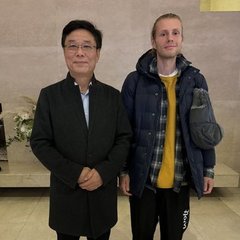-
Content count
8,405 -
Joined
-
Last visited
-
Days Won
76
About dwai
-
Rank
Tadekam evadvitiyam
Recent Profile Visitors
28,183 profile views
-
If you want to get to daobums here are the rules please send a prayer and say thank you to Jules
-

Self-knowledge and mystical experiences - James Swartz
dwai replied to dwai's topic in General Discussion
Ramana Maharishi also had similar comments on what he called “Manolaya” (suspension of the mind) as opposed “manonasha” (cessation of the mind). It is widely accepted that samadhi (nirvikalpa) is temporary and while it can be a very important step in the process, it is not permanent or complete. it depends on what you mean by jnana Tattva jnana is the direct realization of our true nature, but its effect is permanent in the intellect/mind. The mind is permanently changed. Then you have more exposure to him than I do. I only went by what I read in the short aphorisms he posted. I don’t think he’s saying anything different. But that’s just how I processed his words. Someone else might process it differently. -

Self-knowledge and mystical experiences - James Swartz
dwai replied to dwai's topic in General Discussion
That’s a wrong question imho. It is not that awareness wants this or that. The appearances are phenomena that arise in awareness due to ignorance. From awareness point of view nothing has ever happened/is happening/will ever happen. But it is a bit hard for people to accept, so they are eased into the pool (so to speak) -

Self-knowledge and mystical experiences - James Swartz
dwai replied to dwai's topic in General Discussion
What I take away from his aphorism is that the “mind” which “disowns” its true nature (due to ignorance), cannot perform actions to realize it. The realization happens in the mind, through subtle intelligence/discerning intellect (sukshma buddhi). -

Self-knowledge and mystical experiences - James Swartz
dwai replied to dwai's topic in General Discussion
But really, there is nothing apart from awareness, things just appear to be separate. Like how in a dream the dreamer’s mind splits into subject (witness) and objects (dream world). There is no “world” apart from the dreamer’s mind. The waking reality is also like that -

Self-knowledge and mystical experiences - James Swartz
dwai replied to dwai's topic in General Discussion
In Vedanta it is called “para” (absolute) and “apara” (local) jnana (knowledge). The deeper (para) knowledge is pure awareness (chit) itself. The local (apara) knowledge is knowledge of things. The pure awareness is reflected in the mind leading to local knowledge. The way to know this awareness is simply by being aware. But it is so subtle, and the mind is so used to grasping at objects that this awareness is missed (but it’s always present, hidden in plain sight. That’s why the wise say “one is not even a hair’s breadth apart from Dao/Brahman”… But really, there is nothing apart from awareness, things just appear to be separate. Like how in a dream the dreamer’s mind splits into subject (witness) and objects (dream world). There is no “world” apart from the dreamer’s mind. The waking reality is also like that. -

Self-knowledge and mystical experiences - James Swartz
dwai replied to dwai's topic in General Discussion
Knowing (verb) implies knowledge being acquired. That is likely genetic memory. Most of the animal kingdom relies on it. Humans are perhaps the only exception beyond a certain age Intuition. What does this have to do with the OP? -
@zzR I’ve hidden your post as it shares copyrighted material. Please refrain from this in the future. On a different note, we would be happy to read your views on Toltec/nagual/tonal etc.
-
-

Why were the highest spiritual teachings kept hidden/secret
dwai replied to idiot_stimpy's topic in General Discussion
theories and beliefs are basically stories we tell ourselves to explain the inexplicable. That might be the case in western philosophy. Indic philosophy (Hinduism, Buddhism) clearly consider that there is an absolute reality/truth which is the ground of all phenomena. -

Why were the highest spiritual teachings kept hidden/secret
dwai replied to idiot_stimpy's topic in General Discussion
If it is personal “experience” it is still a phenomenon, and therefore not the Truth. -

Why were the highest spiritual teachings kept hidden/secret
dwai replied to idiot_stimpy's topic in General Discussion
I think it boils down to the question each spiritual seeker has to answer for themselves - "What do you want?" If they want "cultivation" and "energy", they'll follow a path that does that. If they want to realize the Truth, they will follow a path leading them to it. I love the Kashmiri Shaivism's "methods" terminology - For very few "anupaya upaya" - spontaneously revealed For a slightly larger group, "shambhava upaya" - revealed through self-inquiry For a somewhat larger group than the above, "Shaktopaya" - revealed through preparation of the energy-body and then the mind through self-inquiry For most people, "Anvopaya" is how the Anu (Atom) builds the body, the energy body, and then works on the mind. It could be a combination of all four because the final realization happens spontaneously, on its own. It's just that the "level" of the seeker determines their access at a given point in time. Mostly, people who have trouble with the "spontaneously happening" realization haven't reached a point where they can intuitively 'get it' (this can happen even before realization occurs). Another could be attachment to method(s). It can be a subtle (or gross) attachment to an identity manufactured by the ego (for example, I am a (fill in the blanks) master. I have spent (fill in the blanks) decades on developing skills in the (fill in the blanks) path). -

Why were the highest spiritual teachings kept hidden/secret
dwai replied to idiot_stimpy's topic in General Discussion
It's the same Advaita Vedanta. -
Issues should be resolved now. We were able to reach Jules and they’ve fixed the issue (disk ran out of space due to a log file getting full)
-
Are folks still getting the timeout issue? Things seem to have been better for the past 24 hrs for me.













.thumb.jpg.7621d8e4dd2d0d878c4efc817a267564.jpg)











